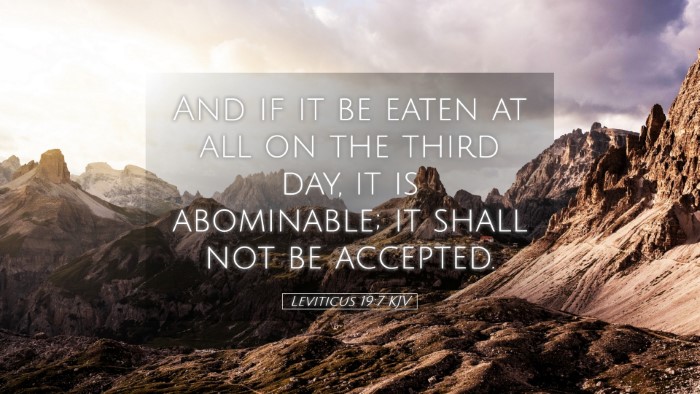Commentary on Leviticus 19:7
Verse Context: Leviticus 19:7 states, "And if it be eaten at all on the third day, it is an abomination; it shall not be accepted." This verse is situated in the broader context of regulations concerning offerings and personal conduct within the community of Israel. This chapter is often celebrated for its ethical instructions that promote holiness and social justice.
Insights from Historical Commentaries
Matthew Henry
Henry emphasizes the profound moral implications of the offered sacrifices. He notes that the instruction concerning the third day of the offering's consumption highlights a principle of reverence towards God and sacred things. Eating the sacrifice on the third day, according to Henry, indicates a lack of respect for the divine laws, suggesting that the offering represents a covenant relationship that requires fidelity and earnestness.
He also points to the symbolic meaning of the third day as it relates to resurrection and renewal. The refusal of the offering after two days represents a failure in the sustenance of spiritual vigor. Henry suggests that this speaks to the timeless human condition, warning against complacency in religious practice.
Albert Barnes
Barnes provides a more detailed cultural context, explaining that the rules regarding offerings were intended to maintain purity and holiness among the Israelites. He highlights that consuming the offering on the third day could result in the meat becoming decomposed or spoiled, thus spiritually reflecting an attitude towards God’s provisions. To partake of holy things in a careless manner transitions sacred activities into profane encounters.
Moreover, Barnes discusses the overarching theme of these regulations. They are not merely about dietary laws but serve as a larger metaphor for the proper state of one's relationship with God. The abomination mentioned refers not just to physical consumption but denotes a spiritual degradation and a breach in the relationship with the divine.
Adam Clarke
Clarke approaches this verse with a keen attention to linguistic detail. He analyzes the Hebrew texts and uses this to unpack the significance of the term "abomination." He notes that it indicates a strong moral repugnance in the eyes of God and illustrates the seriousness with which one should approach religious practices.
Clarke also draws attention to the consequences of disregarding these laws, asserting that neglecting divine ordinances can lead to wider societal decay. He argues that this passage, while ancient, carries enduring significance for modern faith communities, urging believers to recognize the holiness of their actions and the importance of living according to God's statutes.
Thematic Analysis
Holiness and Reverence: Commonly, the key theme derived from this verse across these commentaries is the essential call to holiness. The Israelites were commanded to approach God with reverence, reflecting on the relationship between sacred acts and ethical living.
- The Integrity of Offerings: Each commentary reflects a deep concern for maintaining integrity in sacrificial acts. The passage underscores how offerings should be treated with utmost respect, emphasizing their role in sustaining a covenant relationship with God.
- Community Standards: The instruction places responsibility on individuals to adhere to community standards. Consuming the offering on the third day marked a potential disruption of community holiness, thus reflecting broader social consequences.
- Spiritual Implications: The act of extending temporal consumption into a realm considered sacred illustrates the danger of spiritual apathy. The third day can symbolize a transitional stage where believers might risk falling away from their initial fervor and dedication.
Application to Contemporary Faith
This passage serves as a potent reminder for modern believers, particularly pastors and theologians, to examine the integrity and intent behind their spiritual practices. The notion of sacredness in ritual is paramount, urging congregations to view their acts of worship as extensions of a holy relationship, rather than mere formalities.
Encouragement for Pastors
Pastors are encouraged to educate their congregations on the significance of holiness in both worship and daily life. This exploration of Leviticus 19:7 should instill a sense of accountability among believers — a call to approach God with renewed reverence, ensuring that their acts of worship reflect an understanding of the sacred.
Guidance for Theologians and Students
For students and theologians, this verse provides a rich locus for discussion around the dynamics of community ethics, the interpretation of sacred texts, and the practices of devotion. The theological implications of holiness, the nature of God’s commands, and the social responsibilities of believers are ripe for exploration within academic settings.
Conclusion
In conclusion, Leviticus 19:7 addresses fundamental issues that intersect with the lives of believers. Insights from notable scholars remind us that our engagement with the sacred must be marked by a profound respect and a commitment to uphold the integrity of our offerings to God. It is an invitation to reflect on how we live out our faith within the community and in personal devotion.


